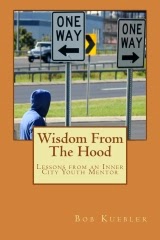 |
Some folks create their own mental profiles about
people.
They make generalizations related to skin color, religion,
weight, neighborhood and how they wear their hoodie.
A Mentor believes that all "hoods are created
with equal opportunity to succeed."
|
Pit bulls can be very dangerous dogs. A poodle can be a very dangerous dog. Danger comes in various sizes and breeds. Dogs do not breed themselves to be dangerous. There are certain character traits in animals that would give them a greater propensity to become vicious. Humans breed a greater viciousness in animals. The ownership of pit bulls has been legislated as illegal in many areas. Here's an example from Florida:
Pit Bull Law
It is illegal in Miami-Dade County to own or keep American Pit Bull Terriers, American Staffordshire Terriers, Staffordshire Bull Terriers, or any other dog that substantially conforms to any of these breeds' characteristics. For more information, view the Miami-Dade County ordinance, Chapter 5, Sec. 5-17. http://www.miamidade.gov/animals/pitbull-law.asp
Breed-Specific Legislation was enacted in many places all over the world targeting "bully-type dogs." By targeting the ownership of certain breeds, folks thought they could help reduce the violence caused by those breeds. The term pit bull is applied to many inter bred bully-type dogs. Is it fair to generalize and use the term "dangerous" on all breeds of pit bulls based on statistically documented violence? That's a question designed to make you think about yourself and your relationship with the person you are mentoring.
Laws that target certain animals based on Breed-Specific Legislation are on the decline. People are beginning to examine the root causes of behaviors. Society has too often enacted legislation based on "knee-jerk reactions" to life altering events. Working together in collaboration is always the best practice to remove the cause with harmful effects.
"Building safer and more humane communities requires multifactorial approaches focusing on improved ownership and husbandry practices, better understanding of dog behavior, education of parents and children regarding safety around dogs, and consistent enforcement of dangerous dog/reckless owner ordinances in communities. National Canine Research Council. (2013). Causes and Prevention. Retrieved from: http://nationalcanineresearchcouncil.com/dogbites/causes-and-prevention/2 Patronek, G.J., Sacks, J.J., Delise, K.M., Cleary, D.V., & Marder, A.R. (2013). Co-occurrence of potentially preventable factors in 256 dog bite-related fatalities in the United States (2000-2009). Journal of the American Veterinary Medical Association, 243(12), 1726-1736.
Another interesting study was done by the American Academy of Forensic Sciences. They found a correlation between vicious dogs and their owners. It seems many people with anti-social tendencies have a tendency to own dogs considered to be dangerous. The following information was taken from Wikipedia:
- Keywords:
- forensic science; vicious dogs; dog owners; criminal thinking; forensic science; personality
- Abstract: Every year over 885,000 dog bites require serious medical attention. Based on human injury and insurance claims, six dog breeds were designated as “vicious” (Akitas, Chows, Dobermans, Pit Bulls, Rottweilers, and Wolf-mixes). This study was conducted to expand on previous research examining antisocial tendencies and personality styles of people choosing to own vicious breeds. Seven hundred and fifty-four college students completed a questionnaire assessing type of dog owned, criminal thinking, callousness, personality, alcohol usage, and deviant lifestyle behaviors. Vicious dog owners reported significantly higher criminal thinking, entitlement, sentimentality, and superoptimism tendencies. Vicious dog owners were arrested, engaged in physical fights, and used marijuana significantly more than other dog owners. However, the homogeneous sample utilized could impact the generalizability of these findings. Choosing to own a vicious dog may be a “thin slice” indicator of more antisocial tendencies.Schenk, Allison M.; Ragatz, Laurie L.; Fremouw, William J. (2012). "Vicious Dogs Part 2: Criminal Thinking, Callousness, and Personality Styles of Their Owners". Journal of Forensic Sciences(American Academy of Forensic Sciences) 57 (1): 152–59.doi:10.1111/j.1556-4029.2011.01961.x.
Let's go back and visit Miami and Dade County for another look at generalizations with roots embedded in knee-jerk reactions. Trayvon Martin was a young man in a hoodie who died at the hands of someone who thought he looked suspicious. There's many sides to that story including racial profiling and generalizations based upon race and clothing. Many folks including President Obama believe that creating new laws will help balance racial inequalities. Making new laws could have an impact. Maybe we need a law that would prohibit volunteer neighborhood watchmen from carrying a gun. This isn't an article about anybody's guilt or innocence. Nor is it an expose' on the tragedy surrounding the death of Trayvon Martin. This is an appeal for you as a mentor to look deeply into yourself and examine your motives for becoming a mentor. This is an appeal for you as a mentor to look for any profiling tendencies in your own character.
George Zimmerman bought a gun because of several altercations with a pit bull. He was advised by an animal control officer to get a gun for protection instead of pepper spray. Nobody has blamed the pit bull for causing the death of Trayvon. George became a neighborhood watchman because of a string of robberies in his neighborhood allegedly committed by young African American men. It seems to me that Trayvon fit the profile of Zimmerman's preconceived suspicions. Trayvon could fit the profile of thousands of inner city young men all over this country; Basically good hearted young guys who sometimes make bad decisions based on their immaturity who need a mentor. Laws do protect people. Mentors help people grow more compassionate so they don't break laws.
"Suspicious Minds" was a song made famous by Elvis Presley. If you have a suspicious mind regarding the behavior of the person you are mentoring, what are your suspicions based on? Is there evidence in their actions that suggests a reason for you to be suspicious?
"Be aware that a suspicious mind will manufacture suspicions and place them like labels on the hearts of other people. Something that never existed can manifest itself through suspicion."
I was a teenager at football camp during my sophomore in high school. I was in the restroom with a friend who was smoking a cigarette. I did not smoke at the time. My friend asked me to hold his cigarette while he washed his hands. The Coach walked in and saw me holding the cigarette. I was accused of breaking team policy and I was suspended. Nobody believed that I wasn't smoking. To teach those "know-it-all's" a lesson, I decided to start smoking. I smoked for about sixteen years after that. As a young man my decision making ability was impaired by immaturity. The suspicions of adults based upon generalizations had a hand in my bad decision. I do not blame them but I do see a better way as an adult mentor. All children are equal. All children deserve compassion. All children deserve a mentor.
MENTOR FORCE REFLECTIONS
- Do you have any unhealed areas in your heart that you place on other people?
- Are you a suspicious person?
- How do these words fit into a description of your character:
- love
- joy
- peace
- patience
- kindness
- goodness
- faithfulness
- gentleness
- self-control
- endurance
- perseverance
- compassion
The picture above is the cover of the book: "Wisdom From The Hood."
Thanks for your time.
Go do something nice for somebody.
Bob Kuebler
Founder / Mentor Force
Mentor Force is an organization of initiators.
We help young people who are at risk of leading impoverished and violent lives.
We teach teachers, mentors, coaches, parents and youth leaders
how to build
healthy relationships that make young people feel valued.
Our goal is to ensure
that every student has the benefit of being guided by a Mentor.
If we can help you reach your
potential as a Mentoring organization
please contact us: 716-830-8240
mentorforcebuffalo@gmail.com.
We are available for school
assemblies and educator conferences.





